外研社六年级英语毕业考试知识点整理.doc
- 格式:doc
- 大小:92.00 KB
- 文档页数:17
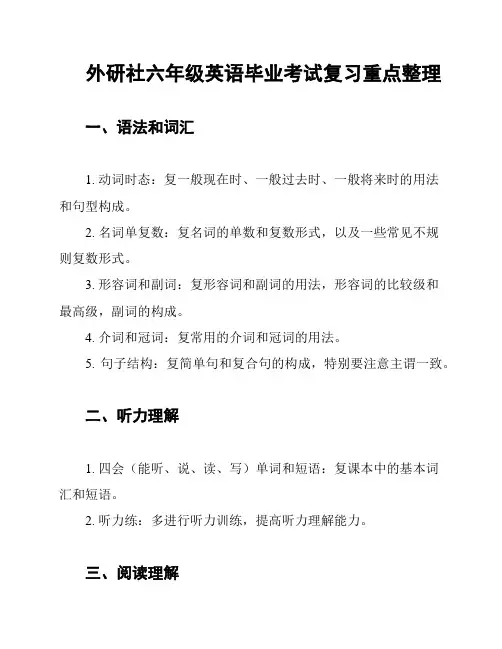
外研社六年级英语毕业考试复习重点整理
一、语法和词汇
1. 动词时态:复一般现在时、一般过去时、一般将来时的用法
和句型构成。
2. 名词单复数:复名词的单数和复数形式,以及一些常见不规
则复数形式。
3. 形容词和副词:复形容词和副词的用法,形容词的比较级和
最高级,副词的构成。
4. 介词和冠词:复常用的介词和冠词的用法。
5. 句子结构:复简单句和复合句的构成,特别要注意主谓一致。
二、听力理解
1. 四会(能听、说、读、写)单词和短语:复课本中的基本词
汇和短语。
2. 听力练:多进行听力训练,提高听力理解能力。
三、阅读理解
1. 阅读技巧:研究如何快速获取文章主题和关键信息。
2. 理解文章:研究如何理解文章中的内容和推理出逻辑关系。
3. 词汇理解:通过阅读文章来扩大词汇量并提高对新词汇的理解能力。
四、写作表达
1. 句型构造:复一些常用的句型结构,如表示建议、请求、询问和祝福的句型等。
2. 语言表达:研究使用一些丰富的词汇和表达方式,使文章更有表现力。
3. 书写规范:注意书写的规范性和准确性,避免拼写和语法错误。
五、口语交流
1. 与他人交流:多进行口语练,提高听懂和回答问题的能力。
2. 角色扮演:通过角色扮演的方式练日常对话和情景交流。
以上是外研社六年级英语毕业考试复习的重点整理,希望同学们能够认真复习,取得好成绩!。
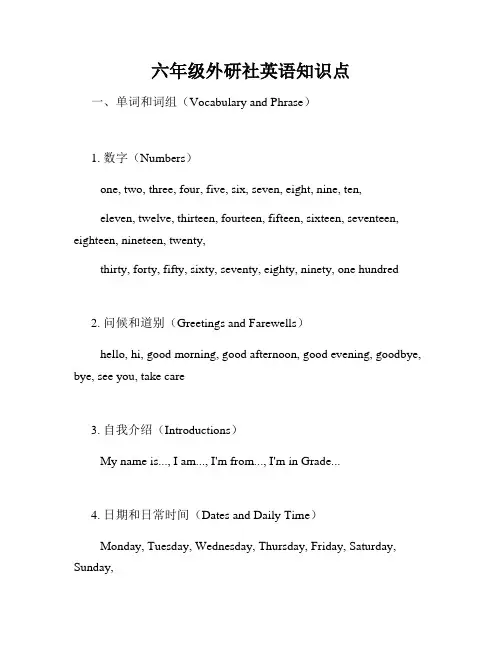
六年级外研社英语知识点一、单词和词组(Vocabulary and Phrase)1. 数字(Numbers)one, two, three, four, five, six, seven, eight, nine, ten,eleven, twelve, thirteen, fourteen, fifteen, sixteen, seventeen, eighteen, nineteen, twenty,thirty, forty, fifty, sixty, seventy, eighty, ninety, one hundred2. 问候和道别(Greetings and Farewells)hello, hi, good morning, good afternoon, good evening, goodbye, bye, see you, take care3. 自我介绍(Introductions)My name is..., I am..., I'm from..., I'm in Grade...4. 日期和日常时间(Dates and Daily Time)Monday, Tuesday, Wednesday, Thursday, Friday, Saturday, Sunday,January, February, March, April, May, June, July, August, September, October, November, December,today, tomorrow, yesterday, morning, afternoon, evening, night5. 家庭(Family)family, father, mother, brother, sister, grandfather, grandmother, uncle, aunt, cousin6. 动物(Animals)dog, cat, horse, bird, fish, rabbit, lion, tiger, elephant, monkey7. 颜色(Colors)red, yellow, blue, green, orange, purple, pink, black, white, brown8. 食物(Food)apple, banana, orange, grapes, strawberry, watermelon, bread, rice, noodles, milk, juice9. 体育运动(Sports)football, basketball, swimming, running, cycling, tennis, volleyball10. 学校(School)school, classroom, teacher, student, desk, chair, book, pen, pencil, ruler, eraser二、语法(Grammar)1. 冠词(Articles)a, an, the2. 人称代词(Personal Pronouns)I, you, he, she, it, we, they3. 现在时态(Present Simple)I/you/we/they + Vhe/she/it + Vs4. 一般疑问句(Yes/No Questions)Do/Does + 主语 + V...?Is/Are + 主语...?5. 情态动词(Modal Verbs)can, may, must6. 物主代词(Possessive Pronouns)my, your, his, her, its, our, their7. 句子的否定形式(Negative Sentences)主语 + do/does + not + V...8. 指示代词(Demonstrative Pronouns) this, that, these, those9. 介词(Prepositions)in, on, at, from, to, with三、句型(Sentence Patterns)1. 询问和回答(Asking and Answering)What is your name? - My name is...How old are you? - I am... years old.Where are you from? - I'm from...What is your favorite color/animal/food...? - My favorite color/animal/food is...Is this/that your...? - Yes, it is. / No, it isn't. It's...2. 描述事物(Describing Things)It is..., They are...It has..., They have...It can..., They can...3. 表示喜好(Expressing Preferences)I like..., I don't like...I prefer..., I don't prefer...四、听力与口语练习(Listening and Speaking Practice)1. 听力练习(Listening Exercises)Listen and number the pictures/words in the correct order.Listen and choose the correct answer.Listen and complete the sentences with the missing words.2. 口语练习(Speaking Exercises)Ask and answer questions about your name, age, and hobbies. Describe your favorite animal/color/food/sport...Talk about your daily routine.五、阅读与写作练习(Reading and Writing Practice)1. 阅读练习(Reading Exercises)Read the passage and answer the questions.Fill in the blanks with the correct words.Match the words with their meanings.2. 写作练习(Writing Exercises)Write a short paragraph introducing yourself. Write a letter to a pen pal.Write a story using the given words.六、口语交际用语(Everyday Conversations)1. 打招呼(Greeting)- Hello! How are you?- Hi! Nice to meet you!2. 自我介绍(Introducing)- What's your name?- My name is...3. 问候(Greetings)- Good morning!- Good afternoon!- Goodbye! See you later!4. 询问与回答(Asking and Answering)- How old are you?- Where do you live?5. 表达喜好(Expressing Preferences)- Do you like...?- Yes, I do. / No, I don't.以上是六年级外研社英语的知识点总结,希望对你有帮助!。
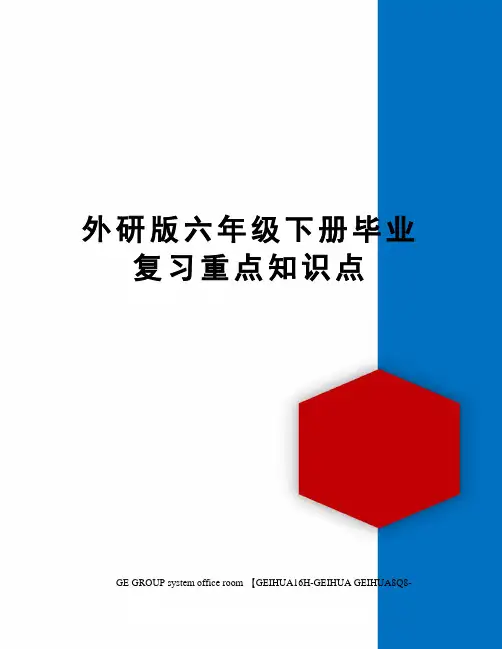
外研版六年级下册毕业复习重点知识点GE GROUP system office room 【GEIHUA16H-GEIHUA GEIHUA8Q8-重点短语和句子1.a hot dog一个热狗2.A cola for me一杯给我的可乐3.three colas三杯可乐4.How much多少钱5.Here you are. 给你?6.Enjoy your meal!享受你的美餐7.Let me take them.让我拿他们.8.Be careful! 小心?9.lots and lots of cheese 许多许多奶酪10.have a seat就座.11.favourite dish最喜爱的菜1.have breakfast吃早饭2.have lunch吃午饭3. have a picnic吃野餐4.at half past twelve在十二点半5. what time几点/什么时间?6.over there 在那边7.look like看起来像?8. a beautiful day一个好天9.in the sky在空中10.to go 剩余11.after dinner晚饭后12.play chess下棋13.let’s=let us 让我们一起1.have a veryinteresting day 度过非常有趣的一天.2.on Saturday在星期六3.send some photos 发送一些照片4.write to……给……写信5.in this photo在这张照片里6.in the tree在树上7.under the tree在树下8.look hungry看起来饿了9.fly away 飞走10.in the mountains 在山里11.drink water喝水12.play hide-and-seek 玩捉迷藏13.look out of....向....外面看14.on the train在火车上15.wear a big hat戴一顶大帽子e to the station来到车站17.the middle of thenight午夜,18. the middle of...在...的中心19.have a lovely time玩得愉快1.at the supermarket在超市2.buy…for…给…买…3.have a birthdayparty举行生日聚会4.talk on the phone打电话/在电话说话5.pick up捡起/拾起6.clean the stairs扫楼梯7.wash the apples洗苹果8.try to do sth.尽量做某事9.get on the bus上公交车?10. get off the bus下车?11. drive the bus驾车,12.What a mess太糟糕1.play the suona吹唢呐e in进来3.the third time 第三次4.cross the street穿过街道5.eat dinner吃晚餐6. talk to.....和...说话7.do exercises做操8.start to rain/snow 开始下雨 /雪9.walk in the park在公园走?10.ride his bike骑她的自行车11.wave to say goodbye挥手说再见12.high up在...上面?13.call out 叫喊?14.have an ice cream 吃冰激凌?15.wake up醒来??16.wake up from my dream从梦中惊醒1.welcome home 回家2.be interestedin……对……感兴趣3.on the earth? 在地球上4.bring back 带回?5.into space 进入太空6.national flag国旗?7.the first time首次?8.a model of 一个……的模型?9.a model of aChinese spaceship? 一个中国的太空飞船的模型?10.decide to(do)…… 觉得做……1.a long time ago很久以前?2.a lot of work 大量的工作?3.fly to the earth 飞向地球?4.make a video 录像e back 回来6.go to the airport去机场7.be proud of 为…感到自豪?8.be born in 出生于9.live to be 活到?10.role model 模范?11.all over the word世界各地?12.teach sb.to do sth.教某人做某事13.teach her to spell 教她拼写e into进入……里面2.bring…for…为…带…3.put…on…把…放在…上4.be easy to do很容易做……5.make mistakes犯错误6.with English words在英语单词方面7.plan to do计划做…8.a baseball game 一场棒球比赛9.wear a raincoat穿雨衣?10.go to the theatre去剧院11.play hide-and-seek捉迷藏12.be a star成为明星13.look at the sky看天空14.look down at me向下看我1.best wishes最美好的祝愿2.say goodbye to跟……道别3.primary school 小学4.write a message写一条留言5.enjoy one’s time享受某人的时光6.good luck for祝……好运?7.have a happy time度过快乐的时光?8.watch footballgames看足球比赛?9.a good idea 一个好主意?10.in every letter 在每一封信中?11.write goodbyeletters给……写道别信1.a goodbye speech一次告别演出??2.middle school中学3.this September今年九月4.at the same time 同时5.go back返回?e back7.keep on(doing)保持(做…),8.keep on practicing Chinese 保持练习汉语9.each other 互相10.be friends 成为朋友?11.say goodbye to 跟…说再见12.write emails写邮件?13.study geography学习地理14.It's time to do…到做…的时候常用动词过去式am/is -was are-weredo--did go -wentget- got?buy--bought? bring--brought?give--gave? see--saw?learn-learnt?put--put??read-read?? make--made?take--took?hang--hung???fly-flew?? spend--spent?come --came? have-had become--became draw -drewteach-taught write--wrote?? tell--told?say--said? can--could?meet--met travel--travelled?plan-planned ask-asked show-showed??finish--finished?thank--thanked?laugh --laughedopen-opened? shout-shouted?play--played? watch--watcheddecide-decided? live--lived? smile —smiled break- broke catch -caught drink-drankeat -ate feel -felt find- foundkeep -kept leave -left let-let ride -rodering -rang run -ransend -sent sing -sangsit -sat sleep -sleptspeak- spoke swim-swamthink -thought will -would win -won常用介词 (有阴影的重点记忆)1)after (在……之后):after breakfast早饭后,after school放学后,2)before (在……之前):before class 课前,before lunch 午饭前3)at (在):at home在家,at school 在学校,at work 在工作。
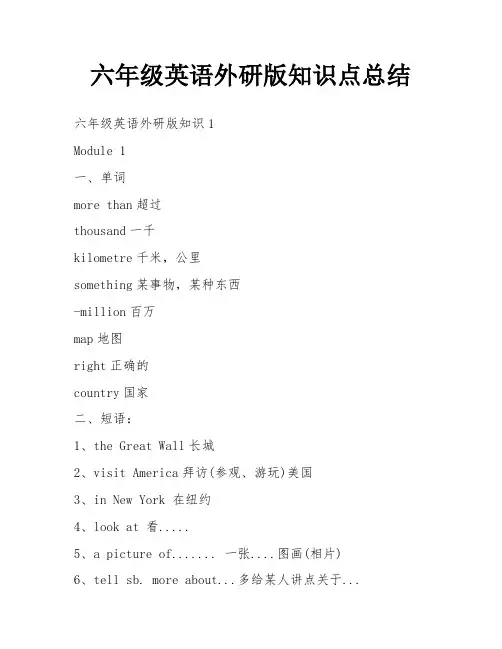
六年级英语外研版知识点总结六年级英语外研版知识1Module 1一、单词more than超过thousand一千kilometre千米,公里something某事物,某种东西-million百万map地图right正确的country国家二、短语:1、the Great Wall长城2、visit America拜访(参观、游玩)美国3、in New York 在纽约4、look at 看.....5、a picture of....... 一张....图画(相片)6、tell sb. more about...多给某人讲点关于...7、how long多长8、It`s about .它是大约(关于)9、six thousand seven hundred kilometres六千七百千米10、tell me something about...告诉我关于...的事11、how big 多大12、eight million people 八百万人13、fourteen million一千四百万14、That`s a lot!太多了!15、be great太棒了16、an animal一只动物17、in the east of在...的东部18、in the west/south/north of在...的西/南/北部19、San Francisco旧金山20、a (big) map of...一(大)张...地图21、lots of=a lot of=many/much许多22、from...to..从....到......23、such a big country=a so big country如此大的一个国家24、every day and night 每个白天和夜晚25、What am I?我是干什么的(什么职业)?三、句子1. How long/how old 的特殊疑问句问某物有多长我们可以用how long…….?如:How long is the Great Wall? 长城有多长?(注意长城前要加the ,并且要大写)How long……? 还可以用来询问时间长短。
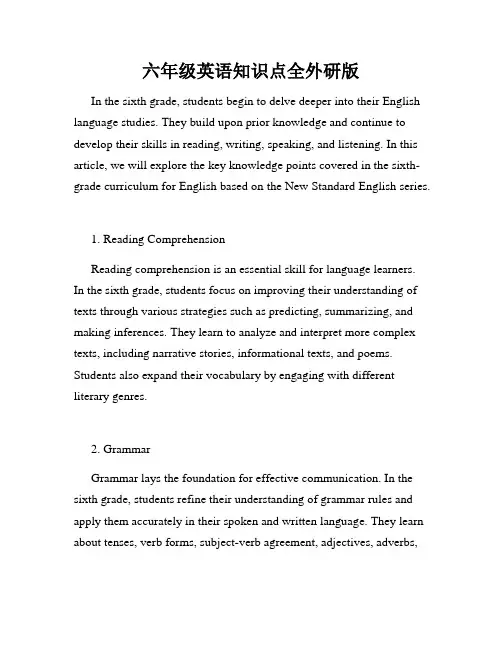
六年级英语知识点全外研版In the sixth grade, students begin to delve deeper into their English language studies. They build upon prior knowledge and continue to develop their skills in reading, writing, speaking, and listening. In this article, we will explore the key knowledge points covered in the sixth-grade curriculum for English based on the New Standard English series.1. Reading ComprehensionReading comprehension is an essential skill for language learners. In the sixth grade, students focus on improving their understanding of texts through various strategies such as predicting, summarizing, and making inferences. They learn to analyze and interpret more complex texts, including narrative stories, informational texts, and poems. Students also expand their vocabulary by engaging with different literary genres.2. GrammarGrammar lays the foundation for effective communication. In the sixth grade, students refine their understanding of grammar rules and apply them accurately in their spoken and written language. They learn about tenses, verb forms, subject-verb agreement, adjectives, adverbs,prepositions, conjunctions, and more. Proper usage of grammatical structures helps students express themselves clearly and correctly.3. Vocabulary BuildingExpanding their vocabulary is crucial for students to express themselves fluently. Sixth-grade students broaden their vocabulary by learning new words and phrases through various contexts. They explore word families, synonyms, antonyms, idioms, and collocations. Vocabulary learning is further reinforced through reading, writing, listening, and speaking activities.4. Writing SkillsWriting serves as a means of self-expression and communication. In the sixth grade, students focus on enhancing their writing skills by practicing different types of writing, such as narratives, descriptions, explanations, and opinions. They learn to structure their writing with clear introductions, supporting details, and conclusions. Students also develop their editing and revising skills to improve the clarity and coherence of their written work.5. Speaking and ListeningEffective oral communication is crucial for language learners. Sixth-grade students engage in various speaking and listening activities to improve their fluency, pronunciation, and comprehension. They participate in discussions, presentations, and role-plays to express their thoughts and ideas. Listening activities involve understanding conversations, instructions, and audio recordings to enhance their listening skills.6. Phonics and PronunciationPhonics and pronunciation are essential components of language learning. Sixth-grade students reinforce their phonics knowledge by practicing the correct pronunciation of individual sounds, blends, digraphs, and diphthongs. They also learn about word stress, intonation patterns, and rhythm to improve their overall pronunciation and communication skills.7. Cultural AwarenessLanguage learning is not just about grammar and vocabulary; it also involves understanding and appreciating different cultures. Sixth-grade students explore cultural topics related to English-speaking countries, including customs, traditions, holidays, and famous landmarks. This broadens their cultural awareness and helps them develop a global perspective.These are the key knowledge points covered in the sixth-grade English curriculum using the New Standard English series. By focusing on these areas, students can strengthen their English language skills and become effective communicators.。
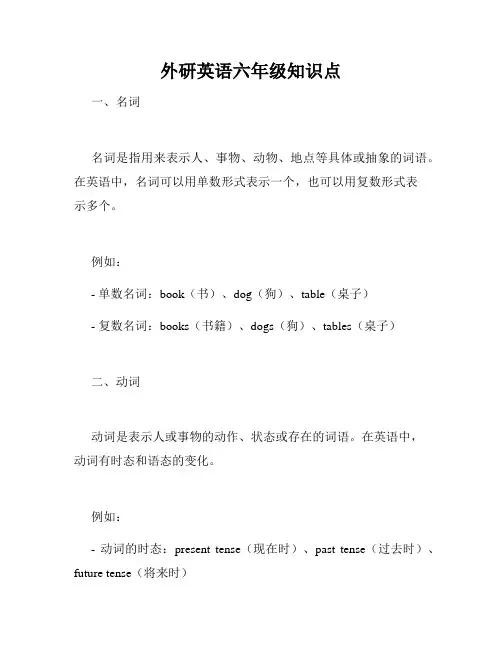
外研英语六年级知识点一、名词名词是指用来表示人、事物、动物、地点等具体或抽象的词语。
在英语中,名词可以用单数形式表示一个,也可以用复数形式表示多个。
例如:- 单数名词:book(书)、dog(狗)、table(桌子)- 复数名词:books(书籍)、dogs(狗)、tables(桌子)二、动词动词是表示人或事物的动作、状态或存在的词语。
在英语中,动词有时态和语态的变化。
例如:- 动词的时态:present tense(现在时)、past tense(过去时)、future tense(将来时)- 动词的语态:active voice(主动语态)、passive voice(被动语态)三、形容词形容词是用来描述名词的特点、性质或状态的词语。
形容词在句子中通常位于名词前面。
例如:- 形容词描述名词特点:a big house(一座大房子)、a beautiful flower(一朵漂亮的花)- 形容词描述名词状态:a happy child(一个快乐的孩子)、a tired student(一个疲惫的学生)四、副词副词是用来描述动词、形容词、其他副词或整个句子的词语。
副词可以用来表示时间、地点、方式、程度等。
例如:- 表示时间的副词:now(现在)、soon(很快)、yesterday (昨天)- 表示地点的副词:here(这里)、there(那里)、everywhere (到处)- 表示方式的副词:carefully(小心地)、quickly(快速地)、quietly(安静地)- 表示程度的副词:very(非常)、quite(相当)、too(太)五、介词介词是用来连接名词或代词与其他词语之间的关系的词语。
介词常常用来表示时间、地点、原因、目的等。
例如:- 表示时间的介词:at(在……点钟)、in(在……期间)、on (在……日子)- 表示地点的介词:in(在……里面)、on(在……上面)、under(在……下面)- 表示原因的介词:because of(因为)、due to(由于)- 表示目的的介词:for(为了)、to(去)六、连词连词是用来连接单词、短语或句子的词语。
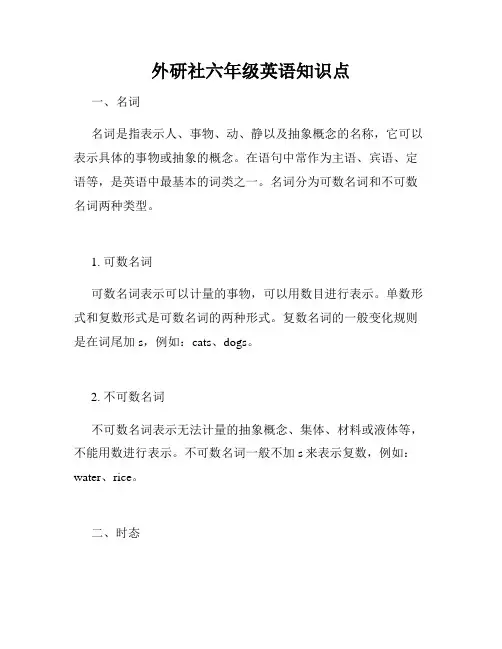
外研社六年级英语知识点一、名词名词是指表示人、事物、动、静以及抽象概念的名称,它可以表示具体的事物或抽象的概念。
在语句中常作为主语、宾语、定语等,是英语中最基本的词类之一。
名词分为可数名词和不可数名词两种类型。
1. 可数名词可数名词表示可以计量的事物,可以用数目进行表示。
单数形式和复数形式是可数名词的两种形式。
复数名词的一般变化规则是在词尾加s,例如:cats、dogs。
2. 不可数名词不可数名词表示无法计量的抽象概念、集体、材料或液体等,不能用数进行表示。
不可数名词一般不加s来表示复数,例如:water、rice。
二、时态时态是英语中表示时间的一种语法形式。
六年级英语学习中,我们主要掌握以下时态:1. 一般现在时一般现在时用于表示经常发生的动作、现在的状态或真理。
一般现在时的基本结构是:主语 + 动词原形(第三人称单数要加s)。
2. 一般过去时一般过去时用于表示过去发生的事情或存在的状态。
其基本结构是:主语 + 动词过去式。
3. 一般将来时一般将来时用于表示将来会发生的动作或存在的状态。
其基本结构是:主语 + will + 动词原形。
三、形容词形容词是描述事物的特征或描述事物性质的词语。
它通常与名词一起作定语,修饰名词。
四、副词副词是修饰动词、形容词、其他副词或整个句子的词语。
它可以用来描述动作的方式、频率、时间、程度等。
五、连词连词是用来连接词、短语、从句或句子的词语。
它可以帮助句子成为完整的语法结构,并起到衔接句子之间逻辑关系的作用。
六、语法语法是指语言中词类、词的形态变化、句法结构和句法规则等的总称。
在学习英语知识时,我们需要掌握正确的语法用法,以构建准确的语言表达。
七、词汇词汇是指一种语言所包括的所有词汇的总和,它是语言基本单位的最小组成部分。
在学习英语知识过程中,积累和掌握大量的词汇是非常重要的。
八、阅读理解阅读理解是指通过阅读文章,理解文章的内容,获取文章中的信息并回答问题。
在六年级英语学习中,我们需要提高阅读理解能力,提高对文章的理解和应用能力。
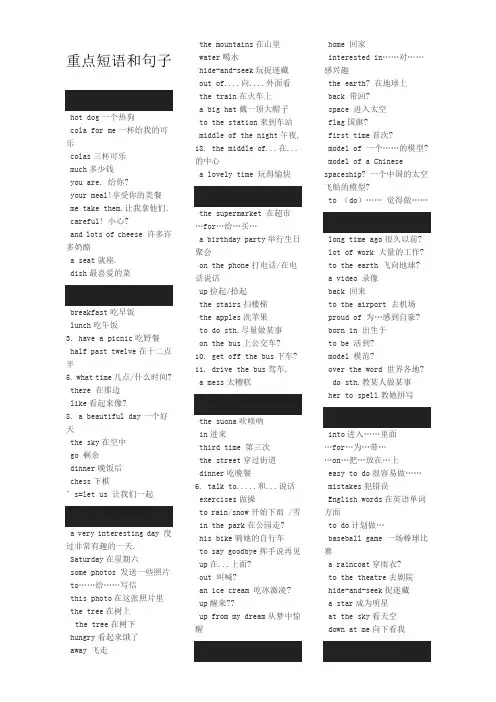
重点短语和句子hot dog一个热狗cola for me一杯给我的可乐colas三杯可乐much多少钱you are. 给你?your meal!享受你的美餐me take them.让我拿他们. careful! 小心?and lots of cheese 许多许多奶酪a seat就座.dish最喜爱的菜breakfast吃早饭lunch吃午饭3. have a picnic吃野餐half past twelve在十二点半5. what time几点/什么时间? there 在那边like看起来像?8. a beautiful day一个好天the sky在空中go 剩余dinner晚饭后chess下棋’s=let us 让我们一起a very interesting day 度过非常有趣的一天.Saturday在星期六some photos 发送一些照片to……给……写信this photo在这张照片里 the tree在树上the tree在树下hungry看起来饿了away 飞走 the mountains在山里water喝水hide-and-seek玩捉迷藏out of....向....外面看the train在火车上a big hat戴一顶大帽子to the station来到车站middle of the night午夜,18. the middle of...在...的中心a lovely time 玩得愉快the supermarket 在超市…for…给…买…a birthday party举行生日聚会on the phone打电话/在电话说话up捡起/拾起the stairs扫楼梯the apples洗苹果to do sth.尽量做某事on the bus上公交车?10. get off the bus下车?11. drive the bus驾车,a mess太糟糕the suona吹唢呐in进来third time 第三次the street穿过街道dinner吃晚餐6. talk to.....和...说话exercises做操to rain/snow开始下雨 /雪in the park在公园走?his bike骑她的自行车to say goodbye挥手说再见up在...上面?out 叫喊?an ice cream 吃冰激凌?up醒来??up from my dream从梦中惊醒home 回家interested in……对……感兴趣the earth? 在地球上back 带回?space 进入太空flag国旗?first time首次?model of 一个……的模型?model of a Chinesespaceship? 一个中国的太空飞船的模型?to (do)…… 觉得做……long time ago很久以前?lot of work 大量的工作?to the earth 飞向地球?a video 录像back 回来to the airport 去机场proud of 为…感到自豪?born in 出生于to be 活到?model 模范?over the word 世界各地?do sth.教某人做某事her to spell教她拼写into进入……里面…for…为…带……on…把…放在…上easy to do很容易做……mistakes犯错误English words在英语单词方面to do计划做…baseball game 一场棒球比赛a raincoat穿雨衣?to the theatre去剧院hide-and-seek捉迷藏a star成为明星at the sky看天空down at me向下看我wishes最美好的祝愿goodbye to 跟……道别school 小学a message写一条留言one’s time 享受某人的时光luck for祝……好运?a happy time 度过快乐的时光?football games看足球比赛?good idea 一个好主意?every letter 在每一封信中?goodbye letters给……写道别信goodbye speech一次告别演出??school中学September今年九月the same time 同时back返回?backon(doing)保持(做…),on practicing Chinese 保持练习汉语other 互相friends 成为朋友?goodbye to 跟…说再见emails写邮件?geography学习地理's time to do…到做…的时候常用动词过去式am/is -was are-were do--did go -went get- got?buy--bought?bring--brought?give--gave?see--saw?learn-learnt?put--put?? read-read??make--made?take--took?hang--hung???fly-flew?? spend--spent?come --came? have-hadbecome--became draw-drewteach-taughtwrite--wrote??tell--told?say--said? can--could?meet--mettravel--travelled?plan-planned ask-askedshow-showed??finish--finished?thank--thanked?laugh --laughedopen-opened?shout-shouted?play--played?watch--watcheddecide-decided?live--lived?smile—smiled break-brokecatch -caughtdrink-drankeat -ate feel -feltfind - foundkeep -kept leave -leftlet- let ride -rodering -rang run -ransend -sent sing -sangsit -sat sleep -sleptspeak- spoke swim -swamthink -thought will-would win-won常用介词(有阴影的重点记忆)1)after(在……之后):afterbreakfast 早饭后,afterschool 放学后,2)before(在……之前):beforeclass 课前,before lunch 午饭前3)at(在):at home在家,at school 在学校,at work在工作。
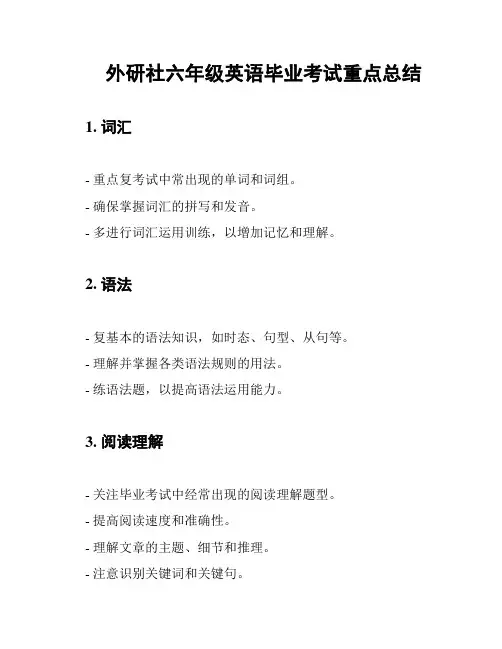
外研社六年级英语毕业考试重点总结1. 词汇
- 重点复考试中常出现的单词和词组。
- 确保掌握词汇的拼写和发音。
- 多进行词汇运用训练,以增加记忆和理解。
2. 语法
- 复基本的语法知识,如时态、句型、从句等。
- 理解并掌握各类语法规则的用法。
- 练语法题,以提高语法运用能力。
3. 阅读理解
- 关注毕业考试中经常出现的阅读理解题型。
- 提高阅读速度和准确性。
- 理解文章的主题、细节和推理。
- 注意识别关键词和关键句。
4. 听力
- 听力是考试中的重要部分,需要积极提高听力能力。
- 多听录音材料,掌握不同场景和题型的听力技巧。
- 熟悉常用的口语表达方式和语速。
- 训练听力记笔记的能力。
5. 口语表达
- 多进行口语练,提高口语表达的流利度和准确性。
- 研究常用口语词汇和句型,进行口语模拟练。
- 注意语音和语调的准确运用。
- 培养自信心理,积极参与口语对话。
以上是外研社六年级英语毕业考试的重点总结,希望能够帮助您顺利备考并取得好成绩。
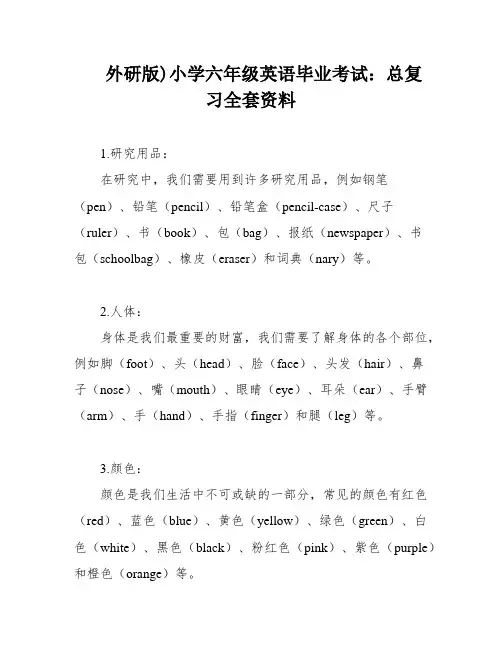
外研版)小学六年级英语毕业考试:总复习全套资料1.研究用品:在研究中,我们需要用到许多研究用品,例如钢笔(pen)、铅笔(pencil)、铅笔盒(pencil-case)、尺子(ruler)、书(book)、包(bag)、报纸(newspaper)、书包(schoolbag)、橡皮(eraser)和词典(nary)等。
2.人体:身体是我们最重要的财富,我们需要了解身体的各个部位,例如脚(foot)、头(head)、脸(face)、头发(hair)、鼻子(nose)、嘴(mouth)、眼睛(eye)、耳朵(ear)、手臂(arm)、手(hand)、手指(finger)和腿(leg)等。
3.颜色:颜色是我们生活中不可或缺的一部分,常见的颜色有红色(red)、蓝色(blue)、黄色(yellow)、绿色(green)、白色(white)、黑色(black)、粉红色(pink)、紫色(purple)和橙色(orange)等。
4.动物:动物是我们生活中的朋友,我们需要了解各种动物的名称,例如猫(cat)、狗(dog)、猪(pig)、鸭(duck)、兔子(rabbit)、马(horse)、大象(elephant)、蚂蚁(ant)、鱼(fish)、蛇(snake)、老鼠(mouse)、袋鼠(kangaroo)、猴子(monkey)、熊猫(panda)、狮子(n)、老虎(tiger)、狐狸(fox)、鹿(deer)、母鸡(hen)、绵羊(sheep)、山羊(goat)、奶牛(cow)、鸟(bird)、骆驼(camel)、青蛙(frog)、猫头鹰(owl)和鹦鹉(parrot)等。
5.人物:在生活中,我们会遇到各种人物,例如朋友(friend)、男孩(boy)、女孩(girl)、母亲(XXX)、父亲(father)、姐妹(sister)、兄弟(brother)、叔叔(uncle)、舅舅(uncle)、男人(man)、女人(woman)、先生(Mr.)、小姐(Miss)、女士(lady)、妈妈(mom)、爸爸(dad)、父母(parents)、祖父母(grandparents)、祖母(grandma/grandmother)、祖父(grandpa/grandfather)、姑姑(aunt)、堂(表)兄弟(cousin)、堂(表)姐妹、儿子(son)、女儿(daughter)、婴儿(baby)、同学(classmate)、人物(people)和机器人(robot)等。
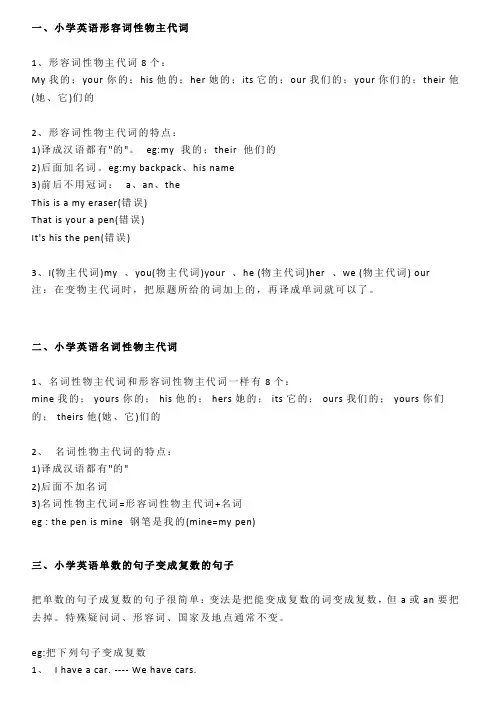
一、小学英语形容词性物主代词1、形容词性物主代词8个:My 我的; your 你的; his 他的; her 她的; its 它的; our 我们的; your 你们的; their 他(她、它)们的2、形容词性物主代词的特点:1)译成汉语都有"的"。
eg:my 我的;their 他们的2)后面加名词。
eg:my backpack、his name3)前后不用冠词:a、an、theThis is a my eraser(错误)That is your a pen(错误)It's his the pen(错误)3、I(物主代词)my 、you(物主代词)your 、he (物主代词)her 、we (物主代词) our注:在变物主代词时,把原题所给的词加上的,再译成单词就可以了。
二、小学英语名词性物主代词1、名词性物主代词和形容词性物主代词一样有8个:mine 我的; yours 你的; his 他的; hers 她的; its 它的; ours 我们的; yours 你们的; theirs 他(她、它)们的2、名词性物主代词的特点:1)译成汉语都有"的"2)后面不加名词3)名词性物主代词=形容词性物主代词+名词eg : the pen is mine 钢笔是我的(mine=my pen)三、小学英语单数的句子变成复数的句子把单数的句子成复数的句子很简单:变法是把能变成复数的词变成复数,但a或an要把去掉。
特殊疑问词、形容词、国家及地点通常不变。
eg:把下列句子变成复数1、I have a car. ---- We have cars.2、He is an American boy. ---- They are American boys.3、It is a car. ---- They are cars.4、This is an eraser. ---- These are erasers.5、That is a backpack. ----- Those are backpacks.6、I'm an English teacher. ------ We are English teachers.7、It's a new shirt. ---- They are new shirts.8、He's a boy. ---- They are boys.9、She's a singer. ------ They are singers.a10、What's this in English? ---- What are these in English?四、小学英语名词的数语法名词有单数和复数两种形式1、名词的单数:表示一个人或一个事物2、名词的复数:表示一个人以上的人或事物名词复数的变化规律如下:1、多数情况下在名词后面加s,s 在清辅音后读【s】2、以s,x,sh,ch为结尾的词在词尾加es, es读作【iz】3、以f ,fe为结尾的词去掉f或fe加ves,ves读作【vz】4、以辅音加y 结尾的词,变y 为ies5、以元音加y 结尾的词,直接加s6、不规则变化man-men;woman-women;policeman-policemen;Policewoman-policewomen 这种情况下a变成e(1)、单复数同形Chinese-Chinese;Japanese-Japanese;sheep -sheep;deer -deer(2)、This 这个;these这些(复数);that那个;those那些(复数);I我;we我们(复数);he他;she她;it它;they他、它、她们(复数);am 、is是are(复数)五、小学英语人称代词主格及宾格人称代词分为主格和宾格,主格和宾格区别:主格和宾格汉语意思相同,但位置不同。
外研社版六年级英语知识点一、单词拼写(Spelling)1. 语音相关知识点(Phonics)phonics, vowel, consonant, sound, letter2. 基础单词(Basic Words)apple, book, cat, dog, elephant, fish, girl, hat, ice cream, juice, kangaroo, lion, monkey, nurse, orange, pencil, queen, rabbit, snake, tiger, umbrella, violin, watch, xylophone, yogurt, zebra3. 数字(Numbers)one, two, three, four, five, six, seven, eight, nine, ten4. 日期和时间(Date and Time)year, month, day, week, clock, hour, minute, second, today, tomorrow, yesterday5. 颜色(Colors)red, yellow, blue, green, orange, purple, pink, brown, black, white6. 人物(Characters)teacher, student, father, mother, brother, sister, friend, doctor, police officer7. 学科(Subjects)math, English, science, music, art, PE, history, geography8. 蔬菜和水果(Vegetables and Fruits)carrot, tomato, broccoli, potato, banana, strawberry, pineapple, watermelon, lemon, grape9. 动物(Animals)elephant, monkey, tiger, lion, giraffe, panda, kangaroo, zebra, rabbit, snake10. 体育运动(Sports)basketball, football, tennis, swimming, running, cycling, skating, volleyball, baseball二、语法(Grammar)1. 时态(Tense)present simple, present continuous, past simple, future simple2. 名词(Nouns)common noun, proper noun, countable noun, uncountable noun3. 代词(Pronouns)personal pronoun, possessive pronoun, demonstrative pronoun, reflexive pronoun4. 形容词(Adjectives)descriptive adjective, possessive adjective, demonstrative adjective5. 形容词比较级和最高级(Comparative and Superlative Adjectives)big, bigger, biggest; hot, hotter, hottest6. 副词(Adverbs)frequency adverbs, manner adverbs, degree adverbs7. 动词(Verbs)action verbs, linking verbs, helping verbs8. 及物和不及物动词(Transitive and Intransitive Verbs)eat (transitive), sleep (intransitive)9. 介词(Prepositions)in, on, at, for, with, by, to, from10. 连词(Conjunctions)and, but, or, so, because三、阅读技巧(Reading Skills)1. 阅读理解(Reading Comprehension)skimming, scanning, predicting, inferring, summarizing2. 动词时态和语态(Verb Tenses and Voice)present, past, future; active, passive3. 词义猜测(Guessing Meaning of Words)context clues, synonyms, antonyms, word roots4. 主旨大意(Main Idea)topic, main idea, supporting details5. 信息细节(Specific Information)fact, opinion, inference四、听力技巧(Listening Skills)1. 日常交流(Everyday Conversations)greetings, introductions, classroom language, asking for directions, making requests, expressing preferences2. 对话和短文听力(Dialogue and Passage Listening)listening for specific information, multiple-choice questions, true/false statements3. 句子听力(Sentence Listening)listening for word stress, sentence stress, intonation4. 命令和指示(Commands and Instructions)imperatives, step-by-step instructions五、口语表达(Speaking)1. 自我介绍(Self-introduction)name, age, nationality, family members, hobbies, favorite subjects2. 问答练习(Question and Answer Practice)using Wh- questions (What, Where, When, Why, Who, How), responding with complete sentences3. 日常交流(Everyday Conversations)making requests, giving directions, expressing opinions, describing people and things, telling stories4. 演讲技巧(Public Speaking Skills)using body language, maintaining eye contact, speaking clearly六、写作技巧(Writing Skills)1. 句子构成(Sentence Construction)subject, verb, object, sentence types (declarative, interrogative, imperative, exclamatory)2. 日记写作(Diary Writing)writing about daily activities, thoughts, feelings3. 书面表达(Written Expression)descriptive writing, narrative writing, opinion writing, writing a letter or email, writing a report4. 作文写作(Essay Writing)expository writing, persuasive writing, descriptive writing, narrative writing七、阅读(Reading)1. 故事和短文阅读(Story and Passage Reading)fiction, non-fiction, genres, story elements (plot, characters, setting), main idea, supporting details2. 动画书和图画书阅读(Picture Book Reading)visual literacy, interpreting illustrations, predicting, summarizing3. 儿童文学(Children's Literature)classic stories, folk tales, fables, novels, poetry4. 阅读速度和准确性(Reading Speed and Accuracy)fluency, comprehension, word recognition八、写作(Writing)1. 作文写作(Essay Writing)prewriting, drafting, revising, editing, proofreading, publishing2. 描述写作(Descriptive Writing)using sensory details, figurative language, adjectives, adverbs3. 议论文写作(Argumentative Writing)stating opinions, supporting arguments, counterarguments, concluding statements4. 叙述文写作(Narrative Writing)story elements (plot, characters, setting), dialogue, sequencing九、语言文化(Language and Culture)1. 音乐与歌曲(Music and Songs)singing along, learning lyrics, understanding cultural context2. 节日和庆典(Festivals and Celebrations)Chinese New Year, Christmas, Thanksgiving, Halloween, Easter3. 食物和饮料(Food and Drinks)traditional dishes, eating etiquette, table manners4. 习俗和传统(Customs and Traditions)greetings, gestures, holidays, ceremonies以上是外研社版六年级英语的知识点总结。
外研社六年级英语毕业考试知识点整理1外研社六年级英语毕业考试知识点整理一、各分册重要知识点外研版第1册主要内容词汇:boy girl door window blackboard bird desk chair red blue yellow green black dog cat cap panda one two three four five six seven eight nine ten eleven twelve school teacher bag pencil pen book cake kite mother father grandpa grandma sister brother doctor driver policeman nurse farmer head arm leg foot nose eye mouth ear句子:----Good morning! ----Good morning!----Good afternoon! ----Good afternoon!----How are you?----I’m fine, thank you.----What’s your name?----I’m ….----Point to the door/window/blackboard…..----Stand up/ Sit down, please.----What colour?----It’s red/blue….----How many? ----One/Two/Three….----What’s this/that? ----It’s a chair/desk…----Happy birthday! ----Thank you.---- Here’s your present/cake. ----Thank you.----How old are you? ----I’m nine.----Is it a cat? ----Yes, it is./ No, it isn’t.----Where’s the cat? ---I don’t know./ It’s in the green bag.---- This is my father.----He/She’s a doctor/nurse…. \---- This is his/ her arm/head….外研版第2册主要内容词汇:song toy car ship doll animal monkey tiger lion elephant big small fat thin tall short sport football basketball table tennis riding bikes swimming skipping meat rice noodles fish milk banana pear orange apple Chinese Maths Science Music Art PE play sleep sing give eat Christmas spring summer autumn winter hot warm cool cold sunny windy dress coat sweater T-shirt bike bus walk in on under park词组:get up go to school have lunch go home watch TV go to bed have breakfast have dinner Spring Festival New Year fly kites go to work by bus by bike go fishing句子:My favourite toy is a car/ doll….----What’s this/that? ----It’s a tiger.----What are they? ------ They’re lions.I like/ don’t like football/ basketball….I like/ don’t like swimming/skipping….----Do you like meat? ----Yes, I do./ No, I don/t.----Does Daming/he/ she like bananas? -----Yes, he does./ No, she doesn’t.I get up at seven o’clock.----What’s the time, please? ---- It’s half past seven.----What do you do at the weekend? ----- I play football.----What does he/she do at the weekend? ---- He/ She watches TV.Happy New Year.It’s spring/ summer/ autumn/ winter.It’s warm/hot/cool/cold in spring/summer/ autumn/ winter.I’ve got a new book.----Have you got a new book?--- Yes, I have. / No, I haven’t.----Has Tom/he/she got a new book? ----Yes, he/she has. / No, he/she hasn’t.Amy/ He/ She goes to school by bike/ by bus/by car.I t’s in/ on/ under the desk….外研版第3-4册主要内容(一)、情境问答:第三册1. Have you got_______? Yes, I have. No, I haven’t.2. Excuse me. Where’s the________, please?Go straight on. Turn right. Turn left.3. What are you doing? I’m _______What is he/she doing? He’s/She’s ___________What are they doing? They’re __________4. Do you want some _______? Yes, please. No, thank you.5. Can you _____ ? Yes, I can. No, I can’t.6. What are you going to do? I’m/We’re going to _______7. Can I have some ______ ? Yes, you can. Sorry, you can’t.8. How many ____ are there in ____? There is/are______第四册9. Is it _____? Yes, it is. No, it isn’t.10. Will you _____ ? Yes, I will. No, I won’t.11. Was he/she/it _____? Yes, he/she/it was. No, he/she/it isn’t.Were you ______? Yes, I was. No, I wasn’t.12. Did you/he/she/they____? Yes, I/he/she/they did. No, I/he/she/they didn’t. (二)、词组短语第三册take pictures watch TV read a bookwrite a letter listen to music talk to my friendplay with in the park look atrow a boat under the tree play chessplay football play basketball play table tennismake a cake do the high jump do the long jump第四册have a picnic go swimming go to the parkdo homework speak English情景运用:第三册1. 问路、指路Excuse me. Where’s the _______, please?Go straight on. / Turn left. / Turn right.2.询问对方正在做什么What are you doing? I’m _______What is he/she doing? He’s/She’s ___________What are they doing? They’re __________3. 询问对方是否要吃某种食物Do you want some _______?Yes, please. No, thank you.4. 询问对方的能力Can you _____?Yes, I can. No, I can’t.5. 谈论将要做的事情What are you going to do?I’m/We’re going to _________6. 向别人要东西吃Can I have some ______ ?Yes, you can. Sorry, you can’t.第四册7. 介绍某人This is_______8. 谈论周一至周日将要做的事What will you do on Monday?I’ll_______ on MondayWill you ______ on Monday?Yes, I will. No, I won’t.9. 做天气预报It will be hot/cold/sunny/windy.It will snow/rain.10. 做比较如: Sam is older than Daming.外研版第5-6册主要内容e backst Sunday/night/year3.go home4.go to school5.go to the park6.hurry up7.in a hurry8.wait for9.make a list 10.shopping list 11.half a kilo 12.how many13.how much 14.at the weekend 15.in the morning 16.in the afternoon17.take a photo 18.take photos19.the British Museum 20.Big Ben 21.the Great Wall 22.the London Eye 23.give out 24.be careful25.too many 26.run fast 27.play football 28.half past seven29.get up 30.sit down 31.stand up 32.do morning exercises 33.play chess 34.on the farm 35.all day 36.of course37.go out 38.say hello to39.play basketball 40.play table tennis41.many years ago 42.ten years ago43.three days ago 44. live in45.a lot of=lots of 46.watch TV 47.how about=what about 48.talk about 49.foreign language 50.study/work hard51.an English teacher 52.a Chinese teacher53.by bus/plane/car/train/ship/bike 54.English/ Chinese food 55.at school3.at home 56.at the library 57. library card58.find out 59.be good at 60.look at 61.have /has got62.in the east of China 63. in the west of China64. in the south of China 65. in the north of China66.every year/day 67.send an email 68.a good idea69.listen to 70.be read for1.Did your grandma learn English? Yes,she did. /No, she didn’t.2.What did she have for breakfast? She had eggs and sausages.3.Where are the books about…? They are on Shelf C.4.When did you go to…? I went there in July.5.What about chopsticks? It’s a good idea.6.Why don’t you give him a kite ?7.Did you…? Yes, I did. /No, I didn’t.8.When did you come back ? We came back last Sunday.9.How many bananas do you want? Six,please.10.How much chess do you want? Half a kilo.11.Do you like…? Yes,I do. /No,I don’t.12.Where did you go ? We went to the British Museum.13.What did you do at the weekend? We visited lots of places.14.What’s the matter?15.Whose bag is this ? It’s Lingling’s.16.Is this your cap? Yes, it’s mine.17.There be+ 某物+某地18.Can you…? Yes, I can. /No, I can’t.19.What time do you get up? I get up at half past six.外研版第7-8册主要内容第七册1.These postcards are great! It’s a picture of the Great Wall. Tell me more about theGreat Wall. How long is it?2.There’s a Chinatown in New York! There are lots of Chinese shops andrestaurants there.3.I’ve got lots of stamps. These are some stamps from Canada. This stamp is fromChina.4.Thanksgiving is my favourite festival. We always have a special meal.5.Can you speak English? Can I write to your friend?6.Daming has got a Chinese kite and we fly it in the park. I’ve got some chopsticks,but they are difficult.7.Pandas eat for twelve hours a day.8.Do you often play with dolls? Do you often clean your room?9.Do you want to visit the UN building in New York?10.Don’t talk in the library. Please stand in line.第八册1.What do you want to eat? I want a hot dog, please. How much is it? It’s thirteendollars and twenty-five cents.2.When are we going to eat? We’re going to eat at half past twelve. It’s going tosnow in Harbin.3.The sun is shining. The birds are singing in the trees. The ducks are eating ourpicnic.4.Who can help me? Sorry, I can’t. I’m making Daming’s birthday card. I can helpyou.5.Daming is having a birthday party. Daming is playing the trumpet, but the phoneis ringing.6.I brought you this book. Who gave it to you? Simon’s family gave it to me.7.Shenzhou V flew into space with Yang Liwei. He spent about twenty-one hours inspace. He made a video and now he is very famous.8.Helen Keller became blind and deaf. She couldn’t see and she couldn’t hear. Latershe could read and write. She wrote a book about herself.9.what’s the matter? Why are you laughing? Why are you wearing a raincoat?Because it’s going to rain.10.Are you going to go to middle school this September? Yes. I’m really excited.What are you going to study?二、词汇分类记忆(一)、分类词汇名词:人物 boy girl mother father brother sister friend cousin driver dancer pupil teacher policeman nurse farmer doctor Ms Mr动物 animal dragon tiger lion elephant monkey panda dog cat bird五官身体部分 head eye nose ear mouth hand arm foot leg hair食物 food cake rice meat bread noodles soup fish chocolate mango banana apple pear orange peanut sweets biscuit vegetable milk fruit watermelon ice cheese juice coffee tea场所方位 classroom class school home farm house road supermarket station park lake sea rivereast west north south国家 China England America country交通工具bike bus train boat plane学科 English, Chinese, Math, Science玩具kite, toy, computer game, doll,jigsaw, chess, ball文具bag pencil pen book时间 time today day hour yesterday tomorrow morning afternoon evening weekend spring summer autumn winter January February March April May June July August September October November December Monday Tuesday Wednesday Thursday Friday Saturday Sunday服装hat dress coat T-shirt clothes sweater教室中的物品 desk chair door window其它名词 name present box bottle song winner Christmas tree letter metre kilo homework robot weather postcard matter game life radioCold headache fever动词:运动 play football, play basketball, play table tennis, do morning exercises, go swimming, go cycling, run, high jump, ride, row a boat,系动词 am is are was were feel smell情态动词 can need may should其它动作want, make, cook, wash, please, draw, thank, think, point to, sit down, stand up, know, help, hope, look see, have, has, like, sing , read, write, draw, learn, listen, hear, say, talk, tell, study, speak, drink, drop laugh, give, visit, catch, dance, carry, live, agree, stop, finish, wait, get up, have breakfast, go to school, go to work, have lunch, go home, have dinner, watch TV, take pictures, go straight on, turn right, turn left, understand, argue, wear,went bought had met ran lost learnt形容词:颜色 red blue yellow green black orange purple pink white天气 hot cold warm cool windy sunny心情感觉 fine, happy, favorite, hungry, difficult, thirsty sad, bored, angry, tired, sorry 其它 big small short tall old young new thin fat, great, strong, blind, deafnice shy clever naughty cool cute good bad carefullong wide interesting beautiful wonderful many much famous quiet dangerous better, worse, useful, last dear clean enough副词:疑问副词 where when how why其它副词 here there now then very up down fast high well badly really hard代词:人称代词 I we you he she they it物主代词 my our your his her their its mine yours hers his指示代词 this that these those不定代词 some many much any疑问代词 what, whose, How many, How old, who, How much,数词 one two three four five six seven eight nine ten eleven twelve thirteen fourteen fifteen sixteen seventeen eighteen nineteen twenty thirty forty fifty sixty seventy eighty ninety hundred介词:on in under to at past by with冠词:a an the连词:and, but, because, so, than其它:Yes, No, Hello, Goodbye, Thank you, too, Happy birthday, o’clock, Happy New Year, Spring Festival, Children’s Day, Let’s, Excuse me, Sport Day, Good luck, Come on, Of course, The Great Wall,(二)、重点句型1. Good morning.2. Good afternoon.3. How are you?I’m fine, thank you.And how are you?I’m fine, too.4. What’s your name?My name is Sam. / I’m Sam.5. How many? It’s ten.6. How many boys? Ten boys.7. How many girls? Eleven girls.8. Stand up/ Sit down.9. Point to the door. /window, chair…10. What’s this?It’s a book.11. What’s that?It’s a chair.12. Happy birthday. Thank you.13. Where’s my present ?It’s in the hatIt’s on the hat.It’s under the hat.14. How old are you?I’m eleven.15. Is it a dog?Yes, it is./ No, it isn’t..16. This is my mother.She’s a teache r.This is my father.He’s a doctor.This is my grandpa.He’s a policeman.This is my grandma.She’s a driver.This is my brother.He’s a farmer.This is my sister.She’s a nurse.It’s me.I’m a pupil.17. This is my hand.This is my nose.This is my mouth.These are my eyes.These are my ears.These are my feet.18. What are they?They are monkeys.Are they tall?No, they aren’t.Are they thin?Yes, they are.19.I like football.I don’t like basketball.I like swimming.I don’t like skipping rope.I like skipping rope.I don’t like cycling.20.What’s your favourite colour? It’s blue.21.Sam likes toy cars.He doesn’t like Barbie dolls.22.Amy likes Barbie dolls.She doesn’t like computer games 23.Do you like noodles?Yes, I do./ No, I don’t.24.Does Lingling like meat?Yes, she does./ No, she doesn’t.25.What’s the time , please?It’s four o’clock.It’s half past three.26.I have breakfast at six o’clock.I go to school at eight o’clock.I have lunch at twelve o’clock.I go home at half past five.I have dinner at half past six.27.What do you do at the weekend?I play basketball.I watch TV.I play football.I play table tennis.I go swimming.28.What does Sam do at the weekend? He plays basketball.He watches TV.He plays football.He plays table tennis.He goes swimming.29.What does Amy do at the weekend?She plays basketball.She watchesTV.She plays football.She plays table tennis.She goes swimming.30.What do you have at school?At school I have Chinese, Maths, English and Science.31.Happy New Year.32.Happy Christmas.33. SpringIt’s spring.It’s warm in spring.We go cycling in spring.34.SummerIt’s summer.It’s hot in summer.We go swimming in summer.35. AutumnIt’s autumn.It’s cool in autumn.We play football in autumn.36. WinterIt’s winter.It’s cold in winter.We watch TV and play table tennis in winter.37.What do you do in spring?I go cycling in spring.What do you do in summer?I go swimming in summer.What do you do in autumn?I play football in autumn.What do you do in winter?I watch TV and play table tennis in winter.38. How do you go to school?I go to school by bus.(或 by train, by car, by bike)I go to school on foot.I walk to school.39.How does your father go to work?He goes to work by car.How does your mother go to work?She goes to work by bike.40.Have you got a tiger?Yes, I have./ No, I haven’t.Have you got a new sweater?Yes, I have. / No, I haven’t.41.Has he got a new toy plane?Yes, he has. / No, he hasn’t.Has she got a new dress?Yes, she has./ No, she hasn’t.42.T his is my mother. She’s watching TV.This is my father. He’s reading a book.This is my grandma. She’s writing a letter. This is my grandpa. He’s taking a picture.43. What are you doing?I’m watching TV.44.Do you want some rice?Yes, please./ No, thank you.45.Have you got chopsticks in England ?Yes, we have./ No, we haven’t.45.What are they doing?They’re rowing a boat.46.Can you jump far?(run fast, jump high, ride fast)Yes, I can./ No, I can’t.46.It’s time to go to bed.47.We’re going to go to Hain an tomorrow.48.What are you going to do for Sports Day?I’m going to run 100 metres.49.Can I have an apple?Yes, you can./ Sorry, you can’t.50.Can I have some soup?Yes, you can./ Sorry, you can’t.51.There is some fish.(不可数名词)There are some sweets. (可数名词)There isn’t any soup. (不可数名词)There aren’t any biscuits. (可数名词)52.How many birthdays are there in January?There is one. There four. There aren’t any.53.This is Xiaoyong. He’s a clever pupil. He’s very clever.54.This is a book about London. It’s ve ry nice.55.London is the capital of England.56.This the River Thames. It’s very long and very wide.57.This is Big Ben. It’s very old and very tall.58.This is Hyde Park. It’s very beautiful.59.This is Tower Bridge. It’s very famous and very beautiful.60.We’re going to have a picnic.61.Will you take a ball?Yes, I will./ No, I won’t.63.What is Amy doing?She’s reading a letter.64.I like playing football.65.I love watching TV.66.I like football and watching TV.67.Robots will do everything.68.Robots can walk.69.It will be windy in Beijing.70.It will rain in Hanzhou.71.Amy’s taller than Lingling.72.I’m shorter than Daming.73.Beijing is bigger than Tianjin.74.I think this girl is better than the first girl.75.Do you agree?76.This boy is worse than that boy.77.Washington D.C is the capital of the USA.78.People speak English in America.79.I was two then. Now I am ten.80.He was two then. Now he’s ten.81.They weren’t old then. They were very young.82.Did you help your mother on Saturday? Yes, I did. / No, I didn’t.83.Did Amy help her mother? Yes, she did. / No, she didn’t.84.Did Daming go to school? Yes, he did. / No, he didn’t.85.Where did you go? I went to the Great Wall.86.What did you do yesterday? I played basketball.87.What did you see? I saw some big mountains.88.What did you eat? I ate some bread.89.What did you buy? I bought some pictures.90.Sam had chocolate biscuits yesterday.Today he’s got a stomachache.91.Amy had a cold yesterday. Today she’s got a headache.92.Lingling ha d a headache yesterday. Today she’s got a fever.93.I’ve got a fever.94.There was a tree.95.There were many trees.96.There wasn’t a chair.97.There weren’t many flowers.98.How many bananas do you want? Five bananas, please.99.How much cheese do you want? Half a kilo, please.100.It was sunny, so we could play basketball.101.It rained yesterday, so se couldn’t play basketball.102.Is this your cap? Yes, it’s mine./ No, it isn’t. It’s hers.103.Whose book is this? It’s hers.104.There is too much rubbish.There aren’t enough sun.There are too many chickens.There isn’t enough food.There are too many children.There aren’t enough chairs.105.I can play football well.106.Can you control the ball?Yes, I can. / No, I can’t.107.This man is blind. He cannot see . He cannot walk well by himself. This dog helps him.108.This girl is deaf. She cannot hear well by herself. This dog helps her.109.These firemen cannot find people by themselves. But these dogs help them. 110.What time do you get up? I get up at half past six.111.Are you feeling happy? Yes, I am. / No, I’m not.112.You should look. Then cross the road.113. You shouldn’t walk in the road.114.Should he do his homework? Yes, she should.115.Should she watch TV? No, she shouldn’tan’t.107.This man is blind. He cannot see . He cannot walk well by himself. This dog helps him.108.This girl is deaf. She cannot hear well by herself. This dog helps her.109.These firemen cannot find people by themselves. But these dogs help them. 110.What time do you get up? I get up at half past six.111.Are you feeling happy? Yes, I am. / No, I’m not.112.You should look. Then cross the road.113. You shouldn’t walk in the road.114.Should he do his homework? Yes, she should.115.Should she watch TV? No, she shouldn’t三、不规则动词表Infinitive Pasttense Infinitive Past tense 1. am, is was 2. keep k e pt3. are were4. let let5. become bec a me6.make ma d e7. begin beg a n8.meet m e t9. bite b i t 10. put put11. blow bl e w 12.read read13. buy b ough t14.ride r o de15. catch c augh t 16.run r a n17. come c a me 18.say s ai d19. cost cost 20.see s aw21. cut cut 22. sing s a ng23.dig d u g24. sit s a t25.do d i d 26. sleep sl e pt27. draw dr e w 28.speak sp o ke29. drink dr a nk30.sweep sw e pt31. eat ate32.take t oo k33.fall f e ll 34.teach t augh t35. feed f e d36.tell t o ld37.feel f e lt 38.thinkth ough t39. fly fl ew40. throw thr e w41.forget forg o t 42.understandunderst oo d43. get g o t 44. give g a ve45. wake w o ke 46.go went47. wear w ore48. grow gr e w49. win w o n 50. have/has h a d51. write wr o te 52.know kn e w四、小学英语语法1. have/has 的用法have/has 表拥有,你有我有大家有;两种形式有不同,男他女她动物它,张三李四单个他,has 与之紧相伴;其他形式都跟 have。
外研版小学英语小升初总复习一、字母能按照四线三格正确书写26个字母的大小写并书读字母。
二.词汇1.学习用品:pen钢笔pencil铅笔pencil-case铅笔盒ruler尺子book书bag包newspaper报纸schoolbag书包eraser橡皮dictionary词典2.人体(body):foot脚head头face脸hair头发nose鼻子mouth嘴eye眼睛ear耳朵arm手臂hand手finger 手指leg腿3.【颜色(colours)】:red红blue蓝yellow黄green绿white白black黑pink粉红purple紫orange橙brown棕4.【动物(animals)】:cat猫dog狗pig猪duck鸭rabbit兔horse马elephant大象ant蚂蚁fish鱼snake蛇mouse 老鼠kangaroo袋鼠monkey猴panda熊猫bear熊lion狮子tiger老虎fox狐狸deer鹿hen母鸡sheep绵羊goat山羊cow奶牛bird 鸟camel 骆驼frog青蛙cock公鸡dragon龙owl 猫头鹰parrot鹦鹉5.【人物(people)】:friend朋友boy男孩girl女孩mother母亲father父亲sister姐妹brother兄弟uncle叔叔舅舅man男人woman女人Mr.先生Miss小姐lady女士;小姐mom妈妈dad 爸爸parents父母grandparents祖父母grandma/grandmother(外)祖母grandpa/grandfather(外)祖父aunt姑姑cousin堂(表)兄弟;堂(表)姐妹son儿子daughter女儿baby婴儿classmate同学people人物robot机器人6【职业(jobs)】:teacher教师student学生doctor医生nurse护士driver司机farmer农民singer歌唱家writer 作家actor男演员actress女演员artist画家TV reporter电视台记者policeman(男)警察police警察7.【食品,饮料(food & drink)】:rice米饭bread面包beef牛肉milk牛奶water水egg蛋fish鱼tofu豆腐cake蛋糕hot dog 热狗hamburger汉堡包biscuit饼干noodles面条meat肉chicken鸡肉vegetable蔬菜soup汤ice冰ice-cream冰淇淋cola可乐juice果汁breakfast早餐lunch午餐dinner/supper晚餐meal 一餐cake蛋糕chocolate巧克力sandwich三明治cheese 奶酪sausage香肠dumpling 饺子tea 茶coffee咖啡8.水果,蔬菜(fruit & vegetables):apple苹果banana香蕉pear梨orange橙watermelon西瓜tomato西红柿potato土豆peach 桃strawberry草莓carrot胡萝卜cabbage卷心菜mango芒果9.【衣服(clothes)】:jacket夹克衫shirt衬衫T-shirt丅恤衫skirt短裙子dress连衣裙shoes鞋子sweater 毛衣coat上衣raincoat雨衣shorts短裤hat(有沿的)帽子cap便帽sunglasses太阳镜trousers裤子cloth布10.【交通工具(vehicles)】:bike自行车bus公共汽车train火车boat小船ship轮船car小汽车taxi出租车jeep吉普车plane/airplane飞机11.【事物(other things)】:thing东西window窗户door门desk课桌chair椅子bed床computer计算机light灯teacher's desk讲台picture图画;照片wall墙壁floor地板ball 球baseball 棒球basket ball篮球table tennis乒乓球clock钟表card 卡片postcard明信片football/soccer足球present礼物lamp台灯phone电话sofa沙发shelf书架table 桌子TV电视photo照片plate盘子knife刀fork叉chopsticks筷子gift礼物toy玩具doll洋娃娃ball 球balloon气球kite风筝jigsaw 拼图游戏box盒子umbrella伞violin小提琴piano钢琴trumpet小号yo-yo溜溜球hole洞toothbrush牙刷menu菜单e-card电子卡片e-mail电子邮件money钱12.【地点(locations)】:home家room房间bedroom卧室living room起居室classroom教室school学校park公园library图书馆post office邮局police office警察局hospital医院cinema电影院bookstore书店farm农场zoo动物园garden花园study书房playground操场teacher's office教师办公室library图书馆washroom卫生间art room绘画教室computer room计算机教室music room音乐教室TV room电视机房factory工厂pet shop 宠物商店science museum科学博物馆the Great Wall长城supermarket超市bank银行country国家village 乡村city城市hometown家乡bus stop公共汽车13.【气象(weather)】:cold寒冷的warm温暖的cool凉爽的snow下雪sunny晴朗的hot炎热的rain下雨windy有风的cloudy多云的weather report天气预报14.【Number 数字】One一two二three三four四five 五six六seven 七eight八nine九ten十eleven 十一twelve十二thirteen十三fourteen十四fifteen十五sixteen十六seventeen十七eighteen十八nineteen 十九twenty 二十thirty三十forty四十fifty五十sixty六十seventy七十eighty 八十ninety九十hundred百thousand 一千million 百万15.week【周,星期,时间】weekday周日weekend周末Sunday星期日Monday 星期一Tuesday星期二Wednesday 星期三Thursday 星期四Friday 星期五Saturday 星期六time 时间hour小时day 天today今天morning早上afternoon下午evening 晚上night夜间soon 不久often经常、时常usually通常sometimes有时never从不16.月份(Mouths):January 一月February 二月March 三月April 四月May 五月June 六月July 七月August 八月September 九月October 十月November 十一月December 十二月17.Sport (体育运动):football 足球basketball 篮球table tennis 乒乓球baseball 棒球ball 球skating 滑冰taiji 太极High jump 跳高long jump 跳远running 跑步walk 竞走wushu武术swimming 游泳【季节(seasons)】:spring 春summer 夏autumn 秋winter 冬18.国家——国籍(countries)】:China---Chinese 中国————中国人(的);汉语America----American 美国——美国人(的)England—English 英语---英语(的)Australia——Australian 澳大利亚——澳大利亚人(的)Canada---Canadian 加拿大----加拿大人(的)Japan---Japanese 日本------日本人(的)Mexico----Mexican 墨西哥————墨西哥人(的)France---French 法国——法语China/PRC中国America/USA美国UK联合王国England英国Canada/CAN加拿大Australia澳大利亚New York纽约London伦敦Sydney悉尼19.【十七节日(festivals)】:New Year's Eve 除夕New Year 元旦Spring Festival 春节Lantern Festival 元宵节Dragon Boat Festival 端午节(龙舟节)the Mid-autumn Festival 中秋节Teathers' Day 教师节Christmas 圣诞节Thanksgiving Day 感恩节Halloween 万圣节Flay Day 国旗日20.【动词及短语(verbs)】:look at 看着pass 传递get up 起床go to school 上学have lunch 吃午饭go home 回家watchTV 看电视go to bed 上床睡觉have breakfast 吃早饭have dinner 吃晚饭do 做play 玩,打(球)sleep 睡觉sing 唱歌give 给eat 吃fly 放(风筝)have got 拥有has got 拥有(have got的三单)go to work 上班Walk 步行swim 游泳live 居住go straight on 直着走turn left 向左转turn right 向右转write 书写take pictures 照相talk to 和、、、、、交谈play with 玩,摆弄listen to 听read 阅读let's=let us 让我们get on 上(车)get off 下(车)row 划(船)drink 喝,饮用want 需要,想要make 制作cook 烹饪,烧(菜)love 喜爱can 能够run 跑jump 跳ride 骑,乘Wash 洗,清洗draw 画visit 拜访,看望Come on 快点,赶快turn on 打开come in 请进count 数数take 带走,拿走help 帮助learn 学习hope 希望study 学习find 找到bring 带来use 使用stay 停留suggest 建议borrow 借arrive 到达climb 攀登,爬finish 吃完hurry 赶紧,匆忙hurry up 快点wait 等待drop 落下,掉下meet 遇见need 需要understand 明白,理解argue 争吵wear 穿control 控制catch 接住,抓住hear 听到sit 坐sit down 坐下skip 跳(绳)ring 鸣,响feel 感觉到miss 想念tell 告诉lost 丢失smell 闻到cross 穿过should 应该hold 抓住say 说话,讲话collect 收集sound 听起来speak 说,讲(语言)believe 相信copy 模仿clean 清理show 展示,出示become 成为shine 照耀fly away 飘走spend 度过be proud of 以。
外研社六年级知识点外研社六年级知识点六年级上册Module 1 unit1. How long is the Great WallWord: thousand 一千,一千个kilometre 公里might 可能,可以million 百万,百万个phrase: more than 多于tell about 告诉how old 多大too long 太长Great Wall 长城millions of 数百万want to 想要1.How long/how old 的特殊疑问句问某物有多长我们可以用how long…….?How long……? 还可以用来询问时间长短。
How old….? 用来提问年龄,后面的be动词随着人称和数的变化而变化。
2.比较级的用法(more than)比较级可以用于高于或者低于另一方的比较,强调的是两者的比较。
3. 量词(kilometre /metre)4. 辨析too和very我们来区分下too和very的区别,他们都可以放在形容词前,起强调的作用,但too 在意义上比very更强烈。
首先讲very,它的意思是“很,非常”,The TV is very expensive.这台电视机很贵。
(强调高于一般价格)too含有一定的感情色彩,有“令人不能接受”的意思,例如: The TV is too expensive (贵的令人难以接受,买不起)Module 1 unit2. It’s twenty metres tallWord: place 地方,地方building 建筑物,大楼museum 博物馆hundred 百fifty 五十phrase: a beautiful building 一栋漂亮的楼房fifty metres high 五十米高Summer Palace 颐和园the Great Wall of China 中国的长城the people who built it 建造它的人this place 这个地方twenty metres tall 二十米高two hundred years old 两百岁very long 很长very strong 很强壮1.辨析tall和high它们都是用来形容“高的”,不过他们是有区别的,”tall”主要用来形容人的身高,而”high”不能用来形容人的身高,而是形容建筑、山等物体。
外研(一起)六年级Module 1 知识汇总一、词汇长度单位:kilometre(千米,公里) metre(米)li(里)其他:near(在......附近) along(沿着)二、习惯搭配三、知识点:❖ tell sb. about sth. (告诉某人某事)四、惯用表达五、重点句型提问某物的长度的句子:-How long is + 其他?-It’s + 数字+ 长度单位.eg: 1. -How long is the Great Wall?-It’s more than forty thousand li.2. -How long is the bridge?-It’s one hundred metres.外研(一起)六年级Module 2 知识汇总一、词汇动词:spoke(speak的过去式)(说(某种语言))wrote(write的过去式)(写)名词:Chinatown(唐人街,中国城) town(城镇,市镇)subject(主题,话题)tomb(坟墓)其他:everywhere(到处)when(当......时)二、习惯搭配三、重点句型:1. 描述自己过去做过的事情:主语+ 动词过去式+ 其他.eg: 1. I went to the park yesterday.2. Daming ate delicious food last Sunday.2. 描述自己过去没有做过的事情:主语+ didn't + 动词原形+ 其他.eg: 1. I didn’t ride my bike because it was broken.2. Tom’s dog didn’t come back home yesterday.外研(一起)六年级Module 3 知识汇总一、词汇名词:stamp(邮票) sun(太阳) island(岛屿) hobby(爱好) book(簿,册)coconut(椰子)动词:collect(收集)二、习惯搭配三、惯用表达四、重点句型:1. 询问“某人是否有某物”的句型及其答语:-Have you got...?-Yes, I have./ No, I haven’t.eg: 1. -Have you got any stamps from China?-Yes, I have.2. -Have you got a kite?-No, I haven’t.外研(一起)六年级Module 4 知识汇总一、词汇1. Thanksgiving 感恩节2. nearly 差不多,将近3. sure 当然4. December 十二月5. light 灯二、习惯搭配1. the Spring Festival 春节2. on Thanksgiving 在感恩节3. have a lot of fun 过得很愉快4. write a poem 写一首诗5. my favourite day 我最喜欢的日子6. many countries 许多国家7. Christmas trees 圣诞树8. give presents 送礼物 9. send cards 寄卡片三、惯用表达1. Yes, please. 好的,请吧。
(完整word版)外研版六年级下册英语知识点梳理(word版可编辑修改)(完整word版)外研版六年级下册英语知识点梳理(word版可编辑修改)编辑整理:尊敬的读者朋友们:这里是精品文档编辑中心,本文档内容是由我和我的同事精心编辑整理后发布的,发布之前我们对文中内容进行仔细校对,但是难免会有疏漏的地方,但是任然希望((完整word版)外研版六年级下册英语知识点梳理(word版可编辑修改))的内容能够给您的工作和学习带来便利。
同时也真诚的希望收到您的建议和反馈,这将是我们进步的源泉,前进的动力。
本文可编辑可修改,如果觉得对您有帮助请收藏以便随时查阅,最后祝您生活愉快业绩进步,以下为(完整word版)外研版六年级下册英语知识点梳理(word版可编辑修改)的全部内容。
六年级下册英语知识点归纳1六年级下册英语知识点归纳Module 1一、单词短语:hamburger 汉堡包 cola 可乐 juice 果汁 dollar 美元cent 美分enjoy 享受,享用restaurant 餐厅 menu 菜单 cashier 收银员 careful 小心的 look 看上去1、want to do 想要做 want sb to do想要某人做 want sth 想要2、let sb do 让某人做3、be careful 小心4、in all一共,总共二、句子:1、—-Can I help you? -—I want a hot dog,please.2、-—How much is it? 多少钱?--It’s thirteen dollarsand twenty—five cents.3、What do you want?4、What do you want to eat?5、What do you want to drink?6、It looks good. 它看上去不错。
7、I (don’t) know。
外研社六年级英语毕业考试知识点整理一、各分册重要知识点外研版第1册主要内容词汇:boy girl door window blackboard bird desk chair red blue yellow green black dog cat cap panda one two three four five six seven eight nine ten eleven twelve school teacher bag pencil pen book cake kite mother father grandpa grandma sister brother doctor driver policeman nurse farmer head arm leg foot nose eye mouth ear句子:----Good morning! ----Good morning!----Good afternoon! ----Good afternoon!----How are you?----I’m fine, thank you.----What’s your name?----I’m ….----Point to the door/window/blackboard…..----Stand up/ Sit down, please.----What colour?----It’s red/blue….----How many? ----One/Two/Three….----What’s this/that? ----It’s a chair/desk…----Happy birthday! ----Thank you.---- Here’s your present/cake. ----Thank you.----How old are you? ----I’m nine.----Is it a cat? ----Yes, it is./ No, it isn’t.----Where’s the cat? ---I don’t know./ It’s in the green bag.---- This is my father.----He/She’s a doctor/nurse…. \---- This is his/ her arm/head….外研版第2册主要内容词汇:song toy car ship doll animal monkey tiger lion elephant big small fat thin tall short sport football basketball table tennis riding bikes swimming skipping meat rice noodles fish milk banana pear orange apple Chinese Maths Science Music Art PE play sleep sing give eat Christmas spring summer autumn winter hot warm cool cold sunny windy dress coat sweater T-shirt bike bus walk in on under park词组:get up go to school have lunch go home watch TV go to bed have breakfast have dinner Spring Festival New Year fly kites go to work by bus by bike go fishing句子:My favourite toy is a car/ doll….----What’s this/that? ----It’s a tiger.----What are they? ------ They’re lions.I like/ don’t like football/ basketball….I like/ don’t like swimming/skipping….----Do you like meat? ----Yes, I do./ No, I don/t.----Does Daming/he/ she like bananas? -----Yes, he does./ No, she doesn’t.I get up at seven o’clock.----What’s the time, please? ---- It’s half past seven.----What do you do at the weekend? ----- I play football.----What does he/she do at the weekend? ---- He/ She watches TV.Happy New Year.It’s spring/ summer/ autumn/ winter.It’s warm/hot/cool/cold in spring/summer/ autumn/ winter.I’ve got a new book.----Have you got a new book?--- Yes, I have. / No, I haven’t.----Has Tom/he/she got a new book? ----Yes, he/she has. / No, he/she hasn’t.Amy/ He/ She goes to school by bike/ by bus/by car.I t’s in/ on/ under the desk….外研版第3-4册主要内容(一)、情境问答:第三册1. Have you got_______? Yes, I have. No, I haven’t.2. Excuse me. Where’s the________, please?Go straight on. Turn right. Turn left.3. What are you doing? I’m _______What is he/she doing? He’s/She’s ___________What are they doing? They’re __________4. Do you want some _______? Yes, please. No, thank you.5. Can you _____ ? Yes, I can. No, I can’t.6. What are you going to do? I’m/We’re going to _______7. Can I have some ______ ? Yes, you can. Sorry, you can’t.8. How many ____ are there in ____? There is/are______第四册9. Is it _____? Yes, it is. No, it isn’t.10. Will you _____ ? Yes, I will. No, I won’t.11. Was he/she/it _____? Yes, he/she/it was. No, he/she/it isn’t.Were you ______? Yes, I was. No, I wasn’t.12. Did you/he/she/they____? Yes, I/he/she/they did. No, I/he/she/they didn’t.(二)、词组短语第三册take pictures watch TV read a bookwrite a letter listen to music talk to my friendplay with in the park look atrow a boat under the tree play chessplay football play basketball play table tennis make a cake do the high jump do the long jump 第四册have a picnic go swimming go to the park do homework speak English情景运用:第三册1. 问路、指路Excuse me. Where’s the _______, please?Go straight on. / Turn left. / Turn right.2.询问对方正在做什么What are you doing? I’m _______What is he/she doing? He’s/She’s ___________What are they doing? They’re __________3. 询问对方是否要吃某种食物Do you want some _______?Yes, please. No, thank you.4. 询问对方的能力Can you _____?Yes, I can. No, I can’t.5. 谈论将要做的事情What are you going to do?I’m/We’re going to _________6. 向别人要东西吃Can I have some ______ ?Yes, you can. Sorry, you can’t.第四册7. 介绍某人This is_______8. 谈论周一至周日将要做的事What will you do on Monday?I’ll_______ on MondayWill you ______ on Monday?Yes, I will. No, I won’t.9. 做天气预报It will be hot/cold/sunny/windy.It will snow/rain.10. 做比较如: Sam is older than Daming.外研版第5-6册主要内容e backst Sunday/night/year3.go home4.go to school5.go to the park6.hurry up7.in a hurry8.wait for9.make a list 10.shopping list 11.half a kilo 12.how many13.how much 14.at the weekend 15.in the morning 16.in the afternoon 17.take a photo 18.take photos19.the British Museum 20.Big Ben 21.the Great Wall 22.the London Eye 23.give out 24.be careful25.too many 26.run fast 27.play football 28.half past seven29.get up 30.sit down 31.stand up 32.do morning exercises 33.play chess 34.on the farm 35.all day 36.of course37.go out 38.say hello to39.play basketball 40.play table tennis41.many years ago 42.ten years ago43.three days ago 44. live in45.a lot of=lots of 46.watch TV 47.how about=what about 48.talk about 49.foreign language 50.study/work hard51.an English teacher 52.a Chinese teacher53.by bus/plane/car/train/ship/bike 54.English/ Chinese food 55.at school3.at home 56.at the library 57. library card58.find out 59.be good at 60.look at 61.have /has got62.in the east of China 63. in the west of China64. in the south of China 65. in the north of China66.every year/day 67.send an email 68.a good idea69.listen to 70.be read for1.Did your grandma learn English? Yes,she did. /No, she didn’t.2.What did she have for breakfast? She had eggs and sausages.3.Where are the books about…? They are on Shelf C.4.When did you go to…? I went there in July.5.What about chopsticks? It’s a good idea.6.Why don’t you give him a kite ?7.Did you…? Yes, I did. /No, I didn’t.8.When did you come back ? We came back last Sunday.9.How many bananas do you want? Six,please.10.How much chess do you want? Half a kilo.11.Do you like…? Yes,I do. /No,I don’t.12.Where did you go ? We went to the British Museum.13.What did you do at the weekend? We visited lots of places.14.What’s the matter?15.Whose bag is this ? It’s Lingling’s.16.Is this your cap? Yes, it’s mine.17.There be+ 某物+某地18.Can you…? Yes, I can. /No, I can’t.19.What time do you get up? I get up at half past six.外研版第7-8册主要内容第七册1.These postcards are great! It’s a picture of the Great Wall. Tell me more about theGreat Wall. How long is it?2.There’s a Chinatown in New York! There are lots of Chinese shops and restaurantsthere.3.I’ve got lots of stamps. These are some stamps from Canada. This stamp is fromChina.4.Thanksgiving is my favourite festival. We always have a special meal.5.Can you speak English? Can I write to your friend?6.Daming has got a Chinese kite and we fly it in the park. I’ve got some chopsticks,but they are difficult.7.Pandas eat for twelve hours a day.8.Do you often play with dolls? Do you often clean your room?9.Do you want to visit the UN building in New York?10.Don’t talk in the library. Please stand in line.第八册1.What do you want to eat? I want a hot dog, please. How much is it? It’s thirteendollars and twenty-five cents.2.When are we going to eat? We’re going to eat at half past twelve. It’s going tosnow in Harbin.3.The sun is shining. The birds are singing in the trees. The ducks are eating ourpicnic.4.Who can help me? Sorry, I can’t. I’m making Daming’s birthday card. I can helpyou.5.Daming is having a birthday party. Daming is playing the trumpet, but the phoneis ringing.6.I brought you this book. Who gave it to you? Simon’s family gave it to me.7.Shenzhou V flew into space with Yang Liwei. He spent about twenty-one hours inspace. He made a video and now he is very famous.8.Helen Keller became blind and deaf. She couldn’t see and she couldn’t hear. Latershe could read and write. She wrote a book about herself.9.what’s the matter? Why are you laughing? Why are you wearing a raincoat?Because it’s going to rain.10.Are you going to go to middle school this September? Yes. I’m really excited.What are you going to study?二、词汇分类记忆(一)、分类词汇名词:人物boy girl mother father brother sister friend cousin driver dancer pupil teacher policeman nurse farmer doctor Ms Mr动物animal dragon tiger lion elephant monkey panda dog cat bird五官身体部分head eye nose ear mouth hand arm foot leg hair食物food cake rice meat bread noodles soup fish chocolate mango banana apple pear orange peanut sweets biscuit vegetable milk fruit watermelon ice cheese juice coffee tea场所方位classroom class school home farm house road supermarket station parklake sea rivereast west north south国家China England America country交通工具bike bus train boat plane学科English, Chinese, Math, Science玩具kite, toy, computer game, doll,jigsaw, chess, ball文具bag pencil pen book时间time today day hour yesterday tomorrow morning afternoon evening weekend spring summer autumn winter January February March April May June July August September October November December Monday Tuesday Wednesday Thursday Friday Saturday Sunday服装hat dress coat T-shirt clothes sweater教室中的物品desk chair door window其它名词name present box bottle song winner Christmas tree letter metre kilo homework robot weather postcard matter game life radioCold headache fever动词:运动play football, play basketball, play table tennis, do morning exercises, go swimming, go cycling, run, high jump, ride, row a boat,系动词am is are was were feel smell情态动词can need may should其它动作want, make, cook, wash, please, draw, thank, think, point to, sit down, stand up, know, help, hope, look see, have, has, like, sing , read, write, draw, learn, listen, hear, say, talk, tell, study, speak, drink, drop laugh, give, visit, catch, dance, carry, live, agree, stop, finish, wait, get up, have breakfast, go to school, go to work, have lunch, go home, have dinner, watch TV, take pictures, go straight on, turn right, turn left, understand, argue, wear,went bought had met ran lost learnt形容词:颜色red blue yellow green black orange purple pink white天气hot cold warm cool windy sunny心情感觉fine, happy, favorite, hungry, difficult, thirsty sad, bored, angry, tired, sorry 其它big small short tall old young new thin fat, great, strong, blind, deafnice shy clever naughty cool cute good bad carefullong wide interesting beautiful wonderful many much famous quiet dangerous better, worse, useful, last dear clean enough副词:疑问副词where when how why其它副词here there now then very up down fast high well badly really hard代词:人称代词I we you he she they it物主代词my our your his her their its mine yours hers his指示代词this that these those不定代词some many much any疑问代词what, whose, How many, How old, who, How much,数词one two three four five six seven eight nine ten eleven twelve thirteen fourteen fifteen sixteen seventeen eighteen nineteen twenty thirty forty fifty sixty seventy eighty ninety hundred介词:on in under to at past by with冠词:a an the连词:and, but, because, so, than其它:Yes, No, Hello, Goodbye, Thank you, too, Happy birthday, o’clock, Happy New Year, Spring Festival, Children’s Day, Let’s, Excuse me, Sport Day, Good luck, Come on, Of course, The Great Wall,(二)、重点句型1. Good morning.2. Good afternoon.3. How are you?I’m fine, thank you.And how are you?I’m fine, too.4. What’s your name?My name is Sam. / I’m Sam.5. How many? It’s ten.6. How many boys? Ten boys.7. How many girls? Eleven girls.8. Stand up/ Sit down.9. Point to the door. /window, chair…10. What’s this?It’s a book.11. What’s that?It’s a chair.12. Happy birthday. Thank you.13. Where’s my present ?It’s in the hatIt’s on the hat.It’s under the hat.14. How old are you?I’m eleven.15. Is it a dog?Yes, it is./ No, it isn’t..16. This is my mother.She’s a teacher.This is my father.He’s a doctor.This is my grandpa.He’s a policeman.This is my grandma.She’s a driver.This is my brother.He’s a farmer.This is my sister.She’s a nurse.It’s me.I’m a pupil.17. This is my hand.This is my nose.This is my mouth.These are my eyes.These are my ears.These are my feet.18. What are they?They are monkeys.Are they tall?No, they aren’t.Are they thin?Yes, they are.19.I like football.I don’t like basketball.I like swimming.I don’t like skipping rope.I like skipping rope.I don’t like cycling. 20.What’s your favourite colour? It’s blue.21.Sam likes toy cars.He doesn’t like Barbie dolls.22.Amy likes Barbie dolls.She doesn’t like computer games 23.Do you like noodles?Yes, I do./ No, I don’t.24.Does Lingling like meat? Yes, she does./ No, she doesn’t. 25.What’s the time , please?It’s four o’clock.It’s half past three.26.I have breakfast at six o’clock.I go to school at eight o’clock.I have lunch at twelve o’clock.I go home at half past five.I have dinner at half past six.27.What do you do at the weekend?I play basketball.I watch TV.I play football.I play table tennis.I go swimming.28.What does Sam do at the weekend?He plays basketball.He watches TV.He plays football.He plays table tennis.He goes swimming.29.What does Amy do at the weekend?She plays basketball.She watchesTV.She plays football.She plays table tennis.She goes swimming.30.What do you have at school?At school I have Chinese, Maths, English and Science.31.Happy New Year.32.Happy Christmas.33. SpringIt’s spring.It’s warm in spring.We go cycling in spring.34.SummerIt’s summer.It’s hot in summer.We go swimming in summer.35. AutumnIt’s autumn.It’s cool in autumn.We play football in autumn.36. WinterIt’s winter.It’s cold in winter.We watch TV and play table tennis in winter.37.What do you do in spring?I go cycling in spring.What do you do in summer?I go swimming in summer.What do you do in autumn?I play football in autumn.What do you do in winter?I watch TV and play table tennis in winter.38. How do you go to school?I go to school by bus.(或by train, by car, by bike)I go to school on foot.I walk to school.39.How does your father go to work?He goes to work by car.How does your mother go to work?She goes to work by bike.40.Have you got a tiger?Yes, I have./ No, I haven’t.Have you got a new sweater?Yes, I have. / No, I haven’t.41.Has he got a new toy plane?Yes, he has. / No, he hasn’t.Has she got a new dress?Yes, she has./ No, she hasn’t.42.This is my mother. She’s watching TV.This is my father. He’s reading a book.This is my grandma. She’s writing a letter. This is my grandpa. He’s taking a picture.43. What are you doing?I’m watching TV.44.Do you want some rice?Yes, please./ No, thank you.45.Have you got chopsticks in England ?Yes, we have./ No, we haven’t.45.What are they doing?They’re rowing a boat.46.Can you jump far?(run fast, jump high, ride fast)Yes, I can./ No, I can’t.46.It’s time to go to bed.47.We’re going to go to Hainan tomorrow.48.What are you going to do for Sports Day?I’m going to run 100 metres.49.Can I have an apple?Yes, you can./ Sorry, you can’t.50.Can I have some soup?Yes, you can./ So rry, you can’t.51.There is some fish.(不可数名词)There are some sweets. (可数名词)There isn’t any soup. (不可数名词)There aren’t any biscuits. (可数名词)52.How many birthdays are there in January?There is one. There four. There aren’t any.53.This is Xiaoyong. He’s a clever pupil. He’s very clever.54.This is a book about London. It’s very nice.55.London is the capital of England.56.This the River Thames. It’s very long and very wide.57.This is Big Ben. It’s very old and very tall.58.This is Hyde Park. It’s very be autiful.59.This is Tower Bridge. It’s very famous and very beautiful.60.We’re going to have a picnic.61.Will you take a ball?Yes, I will./ No, I won’t.63.What is Amy doing?She’s reading a letter.64.I like playing football.65.I love watching TV.66.I like football and watching TV.67.Robots will do everything.68.Robots can walk.69.It will be windy in Beijing.70.It will rain in Hanzhou.71.Amy’s taller than Lingling.72.I’m shorter than Daming.73.Beijing is bigger than Tianjin.74.I think this girl is better than the first girl.75.Do you agree?76.This boy is worse than that boy.77.Washington D.C is the capital of the USA.78.People speak English in America.79.I was two then. Now I am ten.80.He was two then. Now he’s ten.81.They weren’t old th en. They were very young.82.Did you help your mother on Saturday? Yes, I did. / No, I didn’t.83.Did Amy help her mother? Yes, she did. / No, she didn’t.84.Did Daming go to school? Yes, he did. / No, he didn’t.85.Where did you go? I went to the Great Wall.86.What did you do yesterday? I played basketball.87.What did you see? I saw some big mountains.88.What did you eat? I ate some bread.89.What did you buy? I bought some pictures.90.Sam had chocolate biscuits yesterday.Today he’s got a stomachache.91.Amy had a cold yesterday. Today she’s got a headache.92.Lingling had a headache yesterday. Today she’s got a fever.93.I’ve got a fever.94.There was a tree.95.There were many trees.96.There wasn’t a chair.97.There weren’t many flowers.98.How many bananas do you want? Five bananas, please.99.How much cheese do you want? Half a kilo, please.100.It was sunny, so we could play basketball.101.It rained yesterday, so se couldn’t play basketball.102.Is this your cap? Yes, it’s mine./ No, it isn’t. It’s hers.103.Whose book is this? It’s hers.104.There is too much rubbish.There aren’t enough sun.There are too many chickens.There isn’t enough food.There are too many children.There aren’t enough chairs.105.I can play football well.106.Can you control the ball?Yes, I can. / No, I can’t.107.This man is blind. He cannot see . He cannot walk well by himself. This dog helps him.108.This girl is deaf. She cannot hear well by herself. This dog helps her.109.These firemen cannot find people by themselves. But these dogs help them. 110.What time do you get up? I get up at half past six.111.Are you feeling happy? Yes, I am. / No, I’m not.112.You should look. Then cross the road.113. You shouldn’t walk in the road.114.Should he do his homework? Yes, she should.115.Should she watch TV? No, she shouldn’tan’t.107.This man is blind. He cannot see . He cannot walk well by himself. This dog helps him.108.This girl is deaf. She cannot hear well by herself. This dog helps her.109.These firemen cannot find people by themselves. But these dogs help them. 110.What time do you get up? I get up at half past six.111.Are you feeling happy? Yes, I am. / No, I’m not.112.You should look. Then cross the road.113. You shouldn’t walk in the road.114.Should he do his homework? Yes, she should.115.Should she watch TV? No, she shouldn’t三、不规则动词表Infinitive Pasttense Infinitive Past tense1. am, is was2. keep k e pt3. are were4. let let5. become bec a me6.make ma d e7. begin beg a n8.meet m e t9. bite b i t 10. put put11. blow bl e w 12.read read13. buy b ough t14.ride r o de15. catch c augh t 16.run r a n17. come c a me 18.say s ai d19. cost cost 20.see s aw21. cut cut 22. sing s a ng23.dig d u g24. sit s a t25.do d i d 26. sleep sl e pt27. draw dr e w 28.speak sp o ke29. drink dr a nk30.sweep sw e pt31. eat ate32.take t oo k33.fall f e ll 34.teach t augh t35. feed f e d36.tell t o ld37.feel f e lt 38.thinkth ough t39. fly fl ew40. throw thr e w41.forget forg o t 42.understandunderst oo d43. get g o t 44. give g a ve45. wake w o ke 46.go went47. wear w ore48. grow gr e w49. win w o n 50. have/has h a d51. write wr o te 52.know kn e w四、小学英语语法1. have/has 的用法have/has 表拥有,你有我有大家有;两种形式有不同,男他女她动物它,张三李四单个他,has 与之紧相伴;其他形式都跟 have。